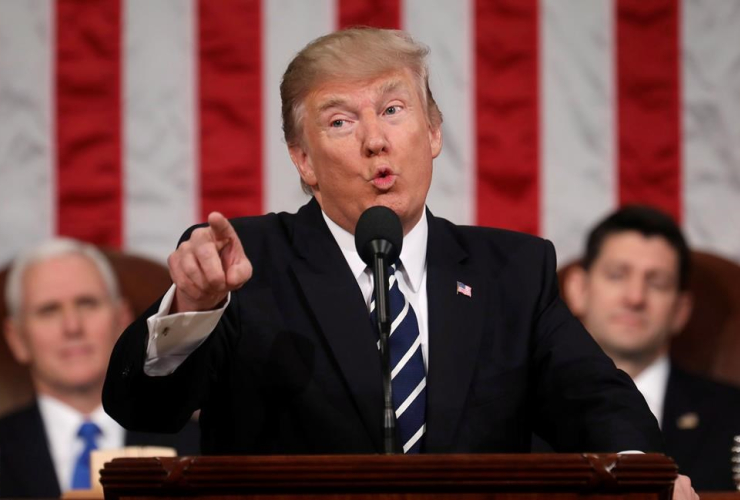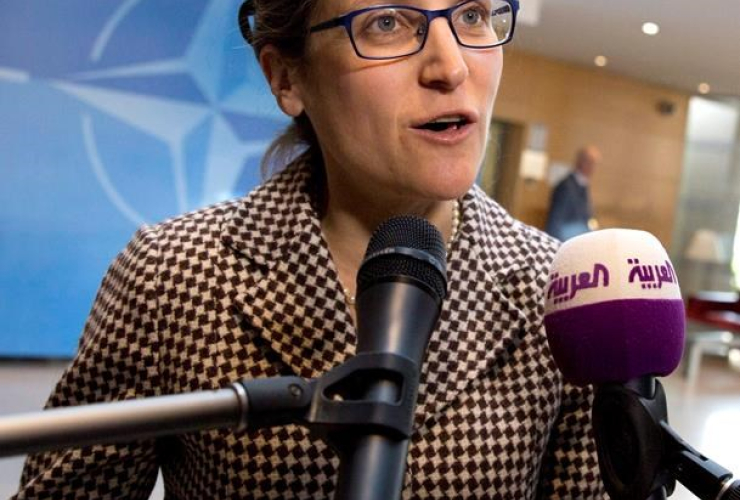Prime Minister Justin Trudeau says he spoke with U.S. President Donald Trump about the airstrikes in Syria and that Canada was briefed about an hour before Thursday night's attack.
Trudeau disclosed the discussions during a statement today in the House of Commons.
Trudeau said that prior to the cruise missile strikes taking place, U.S. Defence Secretary Jim Mattis called Defence Minister Harjit Sajjan, who then briefed the prime minister.
"This morning I spoke with the president directly and emphasized that Canada agrees that Assad's repeated use of chemical weapons must not continue," Trudeau said during question period.
"In the face of such heinous war crimes, all civilized peoples must speak with one voice."
Trudeau is now holding the Syrian government responsible for using chemical weapons against its own people, saying Canada fully supports the U.S. decision to launch a retaliatory strike.
The strike appears to have prompted an abrupt change in Trudeau's position; on Thursday, he stopped short of directly blaming Syrian President Bashar Assad and his government.
Conservative MP Pierre Poilievre asked Trudeau to explain the change, but the prime minister would only reiterate his support of the U.S. action.
Trudeau said Canada supports what he called the "limited focused action" by the U.S. in retaliation for the chemical weapons attack.
The prime minister also denounced Assad's use of chemical weapons, saying "the crimes the Syrian regime has committed against its own people cannot be ignored."
Poilievre asked Trudeau why he feels the need to wait for a meeting of the UN Security Council — a body on which Russia, which supports Assad's government, wields a veto.
"When will the prime minister stop being so dangerously naive and confront this dictator and this tyrant?"
Thursday in New York, the prime minister was not ready to assign blame for Tuesday's suspected sarin attack, which killed more than 80 people.
He promised Canada would be involved in the United Nations process to investigate and punish the perpetrators of the chemical attack that killed civilians, as seen in grotesque images that shocked the world.
Earlier this week, Foreign Affairs Minister Chrystia Freeland said the facts behind the attack had to be clearly established so that those responsible could be held accountable. She said the findings needed to be presented in a "highly credible international fora" so they could not be disputed. She also stopped short of blaming Assad.
Canada and the U.S. are the two leading funders for the UN organization that investigates the use of chemical weapons.
"This week's attack in southern Idlib and the suffering of Syrians is a war crime and is unacceptable. Canada condemns all uses of chemical weapons," Trudeau said today.
He also said Canada will continue to back diplomatic efforts to resolve the Syrian crisis.
Interim Conservative leader Rona Ambrose expressed support for the airstrikes in a statement that also suggested the Liberal government had been left out of the loop while the U.S. was planning its action.
"The global community cannot sit idly by while deadly nerve toxins are unleashed on innocent civilians," Ambrose said.
"Contrary to the prime minister's beliefs, the United Nations Security Council has proven itself woefully ineffectual when it comes to resolving the Syrian conflict. In fact, the prime minister and the government of Canada seem to have been out of the loop on this action by the United States.
"Conservatives have always rejected the Liberal 'go along to get along' approach at the United Nations."
On Thursday, Trudeau called on Russia — but took pains not to name the country — and other supporters of the Assad government to do their part in resolving the crisis.
"States that have been supportive of the Assad regime need to think about their responsibility in the ongoing conflict in Syria that is taking so many lives," Trudeau told reporters in New York.
Russia is the main backer of Syria and as a permanent member of the UN Security Council has used its veto to block all attempts to take action in the war-torn country. The Kremlin also sent its military to Syria in 2015 to prop up Assad's government against rebel forces.
After Tuesday's chemical attack, the Russian government said its support for Assad is "not unconditional." But Russia Today reported that President Vladimir Putin has said it would be unacceptable to make "groundless" accusations about Assad's role in the attack, without proof.
The U.S. fired almost 60 missiles from two warships on Thursday evening against a government-controlled airbase in central Syria.
A spokesperson for National Defence in Ottawa said Canadian Forces personnel were not involved in the missile strike.
The statement added that Canadian operations in the region remain unchanged.




Comments